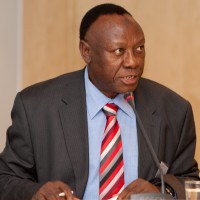Ibrahim Lipumba, a prominent member of Tanzania’s opposition alliance has resigned from the Civic United Front (CUF), days after former Prime Minister Edward Lowassa joined the opposition Chadema Party following his defection from the ruling Chama Cha Mapinduzi (CCM). CUF, Chadema and other opposition groups have formed an alliance, UKAWA, ahead of the October 25 general election.

In his resignation statement, Lipumba accused leaders of the opposition alliance of deviating from the original principles that brought the various opposition groups together, aiming to challenge the dominance of the CCM.
Professor Xavery Lwaitama of the Josiah Kibira University College says the defection of the former prime minister causes a seismic political shift in both the ruling party and the opposition alliance in the run-up to the national poll. He also says Lipumba’s resignation is unlikely to hurt the chances of the opposition alliance in the vote.
The UKAWA opposition alliance plans to choose a single candidate to represent the group in the upcoming election. Lwaitama says it appears the chances of Lipumba becoming the leader of the opposition alliance in the election are slim, following the defection of the former prime minister.
“I suspect that Professor Lipumba had thought that [he] would be one of the presidential candidates, because he was one of the most prominent of the opposition in the alliance UKAWA. So this other party having selected Edward Lowassa as the candidate must have upset the legitimate political ambition of Professor Lipumba, because now he can’t carry the alliance ticket of UKAWA,” said Lwaitama, adding: “That is one of the political earthquakes that are expected when a big shot like the former prime minister leaves a ruling party like the CCM.”
The CCM has dominated Tanzania since the country gained independence in 1961.
Local media reports that the CCM is to blame for the opposition leader’s decision to quit his party. Supporters of the coalition say the CCM wants to undermine the coalition ahead of the election, fearing the defection of the former prime minister would increase the party’s vulnerability in the vote.
“That is why there is speculation that Professor Lipumba leaving might have something to do with the ruling party trying to create trouble in the alliance, because for the first time, the major opposition parties have agreed to field one presidential candidate instead of competing among themselves. So, it is not surprising that Professor Lipumba is now being accused of giving in to pressure from the ruling party,” said Lwaitama.
“It is also possible that Lipumba assessed that it is much better that he is not party to the alliance because the candidate that is going to be fielded by the opposition alliance this time, Edward Lowassa, has a lot of integrity issues around him. And there [are] a lot of misgivings about the opposition alliance fielding Mr. Edward Lowassa, much as he has a lot of influence in the CCM.”
Lwaitama says Lowassa’s influence in the ruling party slices the chances of the CCM in the general election, which he says tilts the balance in favour of the opposition alliance in the poll, despite the resignation of the prominent opposition leader. He also says it is likely that the opposition groups would have enough time to mend fences and be fully prepared in the run up to the general election.










